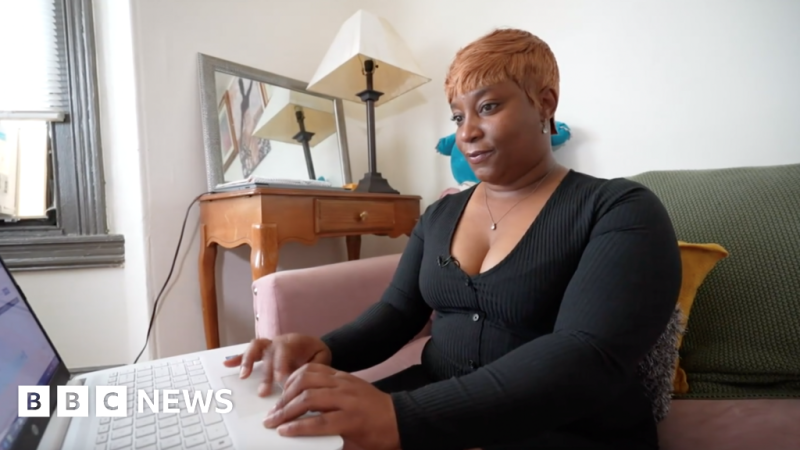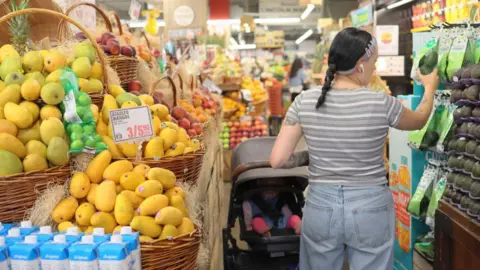US workers in debt to buy groceries - 'I had to downgrade my life'
By: Natalie Sherman and Nathalie Jimenez (BBC News)


Neoliberal economists are totally baffled by this great economy. These neoliberals missed the memo that a larger portion of our labor force relies on gig work and lives on tips instead of wages. The neoliberals wanted to automate typical jobs out of existence. Now the neoliberals want to replace workers with computerized artificial intelligence. And they expect their models to still work?
Neoliberals wanted to do away with the 1980s model of prosperity so they could make a nickel on next quarters stock dividend. The neoliberal plan worked. Now the neoliberals are pissing and moaning that the unwashed, stupid voters aren't happy with their fake neoliberal prosperity.

Stacey Ellis, a lifelong Democrat from Pennsylvania, should be the kind of voter that US President Joe Biden can count on.
But after four years of rising prices, her support has worn thin - and every time she shops at the supermarket, she is reminded how things have changed for the worse.
Ms Ellis works full-time as a nurse's assistant and has a second part-time job.
But she needs to economise. She has switched stores, cut out brand-name items like Dove soap and Stroehmann bread, and all but said goodbye to her favourite Chick-fil-A sandwich.
Still, Ms Ellis has sometimes turned to risky payday loans (short-term borrowing with high interest rates) as she grapples with grocery prices that have surged 25% since Mr Biden entered office in January 2021.
"Prior to inflation," she says, "I didn't have any debt, I didn't have any credit cards, never applied for like a payday loan or any of those things. But since inflation, I needed to do all those things....I've had to downgrade my life completely."
The leap in grocery prices has outpaced the historic 20% rise in living costs that followed the pandemic, squeezing households around the country and fuelling widespread economic and political discontent.
"I'm a Democrat," says Ms Ellis, who lives in the Philadelphia suburb of Norristown. "I love voting for them. But Republicans are speaking volumes right now and Democrats are whispering."
"I want somebody to help me, help the American people," she adds. "Joe Biden, where are you?"
For the president, already contending with serious doubts about his age and fitness for another term, the cost-of-living issue presents a major challenge, threatening to dampen turnout among supporters in an election that could be decided, like the last two, by several tens of thousands of votes in a handful key states.

Grocery prices have surged 25% since Joe Biden entered office
Across the country, Americans on average spent more than 11% of their incomes on food, including restaurant meals last year - a higher proportion than any time since 1991.
The jump in food prices has hit younger, lower-income and minority households - key parts of the coalition that helped Mr Biden win the White House in 2020 - especially hard.
But worries about the issue are widespread: a Pew survey earlier this year found that 94% of Americans were at least somewhat concerned about rising food and consumer goods prices.
That was nearly identical to two years earlier, even though the staggering jumps in food prices that hit the US and other countries after Russia's 2022 invasion of Ukraine have subsided.
Dylan Garcia, a 26-year-old security guard from Brooklyn, says he's never struggled to buy groceries as much as he has now.
Instead of the fresh food and brand-name items he used to enjoy, he now stocks up on ramen noodles and frozen vegetables - and only eats twice a day because he can't afford more.
At checkout, he routinely uses "buy now, pay later" schemes, which allow him to pay the bill in installments, but have led to mounting debt.
"I'm stuck in a loop," he says. "It's become an insecurity to pull up my phone at the register and have to use these programmes. When they see me, it's embarrassing."
Mr. Garcia, who has long voted for Democrats, says his precarious financial situation has made him lose hope in politics and he does not plan to vote in November's election.
"I don't think the government has our best interest and I don't think they care," he says.
 John Wirick
John Wirick
Trump voter Katie Walsh says her makeup business slowed as people cut back
The White House maintains Mr. Biden has been engaged on issues of food affordability, fighting to increase food stamp benefits and other government aid, initiatives opposed by Republicans.
At last month's presidential debate, the first question was on inflation, and Mr Biden sought to shift blame to big companies, accusing them of price gouging -a claim that is hotly disputed among economists.
But despite strong job creation and low unemployment, opinion polls show voters continue to trust Mr Biden's opponent, former President Donald Trump, more on economic issues.
On the CNN debate stage, the Republican White House candidate blamed Mr Biden for stoking inflation, which the White House denies, and said: "It's killing people. They can't buy groceries anymore. They can't."
The Trump campaign in turn denies that policies he proposes - including a 10% tariff on all goods coming into the US - would worsen price rises, as many analysts predict.
"We believe that a second Trump term would have a negative impact on the US's economic standing in the world, and a destabilizing effect on the US's domestic economy," wrote 16 Nobel prize-winning economists in an open letter last month.
Republicans have accused Mr Biden of trying to mislead the public about the extent of the inflation problem, noting that Mr Biden has claimed, incorrectly, that inflation was already at 9% when he entered office. It was 1.4%.
Katie Walsh, a makeup artist in Pennsylvania, voted for Trump in 2020 and says she plans to do so again, based on his economic record.
The 39-year-old says her family has struggled to keep up with inflation, especially since her business has slowed, as people squeezed by higher prices cut back.
"I know he's a big fat mouth," she says of Mr Trump. "But he at least knows how to run the economy."
Analysts say it is clear that the economy is important to voters, but less clear it will prove decisive in the November election.
In 2022, when inflation was at its worst, Democrats did better than expected in mid-term elections, as concerns about abortion access drove supporters to the polls.
This time around, issues such as immigration and fitness for office are also top of many voters' minds, while economic trends appear to be moving in the right direction.
Grocery prices were up just 1% over the past 12 months, well within historic norms; and the cost of a few items, including rice, fish, apples, potatoes, and milk, has even come down a bit.
As major chains such as Target, Amazon and Walmart announce price cuts in recent weeks, there are signs the situation could continue to improve.
Some analysts also expect wages, which have increased but trailed the leap in overall prices, to finally catch up this year, providing further relief.
"We're on the right track," says Sarah Foster, who follows the economy for Bankrate.com. "Wage growth has slowed, price growth has slowed but, you know, prices are slowing at a much faster rate than wages."
Stephen Lemelin, a 49-year-old father of two from Michigan, another electoral battleground, says he was pleasantly surprised by lower prices on a recent supermarket trip.
Whatever his concerns about the economy, the military veteran says his support for Mr Biden, who got his vote in 2020, has never been in doubt, given that he sees Trump as a threat to democracy.
"Nobody likes high interest rates or high inflation but that's not under presidential control," he says. "If you know politics, there's really only one choice."




Today ain't the 1980s. The promises of neoliberal collectivism utterly failed to fix global terrorism, global recession, and global pandemic. Neoliberals really have killed their own economics and they have no one to blame but themselves. The neoliberal measures of economic health look wonderful but the problem is the economy doesn't work that way anymore.
Well, the US could make life even MORE unaffordable by establishing more tariffs on foreign goods and increasing the percentage on existing ones. That should be "helpful".
Tariffs are inflationary!
(But of course the good news is that they are not particulary "neoliberal"!!!)
"Perhaps".
Let's not forget the help being provided by the manufacturers and corporations in their contributions to inflation with their skill in fooling the consumers with "shrinkflation". I'll never forget the praise that the guy got when he showed the corporations how to fool the public by increasing the diameter of the toilet paper and paper towel cardboard centre tubes so the products would look the same size as before but would fool the public into thinking that they contained the same amount of paper. Clever guy, got an award I think.
What do Chinese exporters care since tariffs don't cost them anything. A tariff is just another tax on business from the consumer's point of view.
Well, let me make a stupid guess. Maybe the Chinese exporters care that tariffs mean their products are less affordable and therefore less are purchased.
So, tariffs work like excise taxes on tobacco?
I don't know, I'm not an accountant. All I know is that if an item gets to be too expensive to buy people won't buy it or buy less of it than they usually had done before, and tariffs tend to make things more expensive..